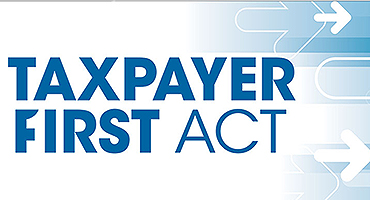
02
Dec
Dec
Taxpayers First Act
The Taxpayer First Act of 2019, which would redesign the Internal Revenue Service, passed both Houses. The bill refocuses the action to live up to its mission of serving taxpayers, overhauling the IRS’ tools of enforcement, and strengthening the IRS’ ability to proactively combat identity theft and fraud. Provisions in this bill protect low- and moderate-income taxpayers, create sensible enforcement reforms, and ensure the IRS provides taxpayers and small businesses the assistance they deserve.
What does the Taxpayer First Act do for you?
- It establishes an independent IRS Office of Appeals, which may require new procedures for taxpayers who want to appeal IRS determinations.
- A fee waiver for low income taxpayers who file for an Offer in Compromise, which has already been in place for at least a decade.
- Sensible Enforcement provisions which is a good feature designed to make our lives easier for things like innocent spouse, private debt collections, third-party contacts, and a few other useful fixes.
- Modernizing the office of the Taxpayer Advocate and the IRS organizational structure.
- New rules and protections for tax whistleblowers.
- The IRS has to give 90 days’ notice when they are going to close a customer service center.
- Misdirected
refunds – Sec. 1407 – this could prove to be helpful to individuals who entered
the wrong bank account for their electronic refunds.
- Until now, the IRS has bowed out of the issue, since they have no actual responsibility for our errors.
- Now Congress mandates them to work with the financial institutions to recover money deposited to the wrong account.
- And huge steps toward improving Cybersecurity and reducing Identity Theft.




